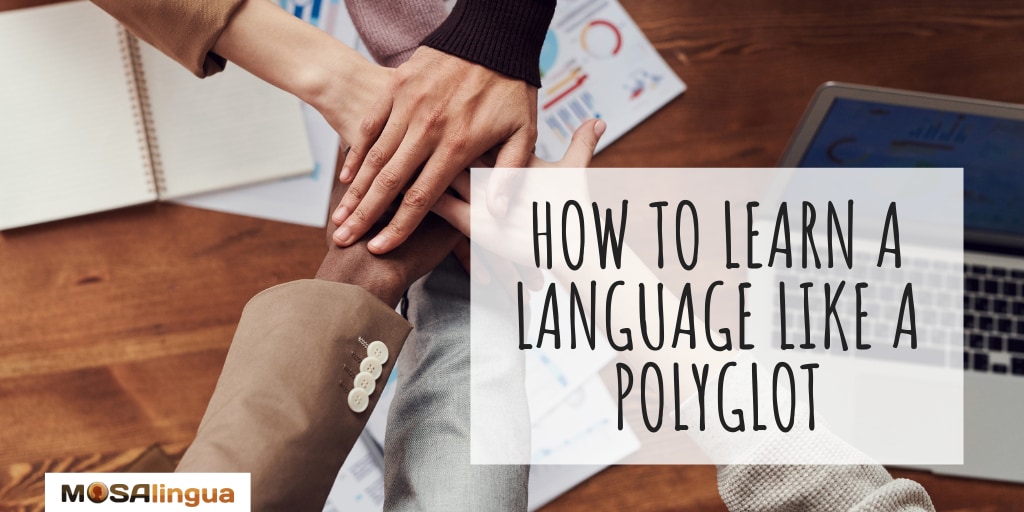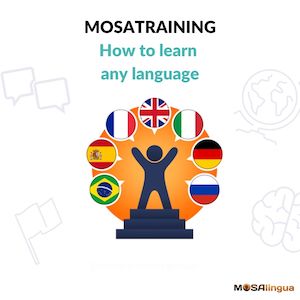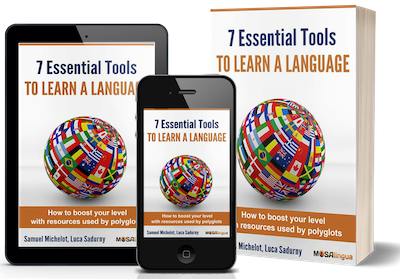How do polyglots learn languages? How do polyglots learn so many languages? What’s their secret? If you’ve heard of famous polyglots who have learned 5, 10, even 15 or more languages, I’m sure those are some of the questions you’ve wondered about! Thankfully, some of my friends happen to be amazing polyglots and were willing to reveal their “polyglot secrets” to help answer them. I hope these 7 polyglot tips will inspire you in your own language endeavors.

What’s inside this article…
How Polyglots Learn Languages and How You Can, Too
When I, Luca, co-founder of MosaLingua, got interested in languages many years ago, I couldn’t figure out how some people managed to learn them in the double digits, while I could barely manage high school English! But much has changed since then—not just my skills, but also my mindset. Now, I speak 8 languages fluently and rub shoulders with many successful polyglots.
What’s the “secret” that got me to where I am today? I’ll share mine at the end of the article, but first I want to give the floor to some of my colleagues and friends, fellow polyglots who were kind enough to share their best polyglot advice. Check out their top tips about how polyglots learn languages. If you put them to use and set your mind to it, I’m sure you’ll make great language progress, too.
If you’d like to listen to the podcast version of this episode, it’s available at the MosaLingua Language Lab:
Benny Lewis

His best tip for language learners is to start speaking from day 1 of your studies. Many people put off expressing themselves in their target language, especially if they have perfectionist tendencies. They think that if they do enough preparation, someday they will be ready to speak. Perhaps in six months, perhaps in two years… Except that magic day never comes, because no matter how much you prepare, how much you study, you’ll always feel like there’s more you could do to feel prepared. Sorry to burst your bubble, but you’ll never actually feel 100% ready to start speaking!
So in Benny’s opinion, the best way to tackle that situation is to decide you’re ready on the very first day. Yeah, you’re going to speak like a caveman. And you’re going to make lots of mistakes. You just have to accept that!
One of Benny’s “polyglot secrets,” which helped him get to where he is today in his language-learning endeavors, is that he starts speaking as early on in the process as possible. Another nice thing about starting from day one is that there’s all the room in the world for improvement. When you start at caveman level, things can only go up!
Luca Lampariello

His #1 tip for learning any language is to figure out why you are learning it. 30 years of experience have taught him that the key to success is an emotional connection with your target language. Making an emotional connection is a good tip in theory, but often proves more difficult to do in practice. You need the how to get you to the why.
So here’s a simple and powerful exercise you can start with. Grab a piece of paper and a pen and picture a person you are going to speak to in your target language. Think about the circumstances of your conversation, what you will talk about, where, why. Using the answers to these questions and the power of your mind, tell yourself a story!
Einstein used to say: “Imagination is more important than knowledge. For knowledge is limited, whereas imagination embraces the entire world, stimulating progress, giving birth to evolution.”
With Einstein’s wise words in mind, Luca recommends writing a lively, captivating, and realistic story in which you “live” your target language. Refer back to it often, especially when you’re in a learning slump, to remind yourself why you started your language-learning journey in the first place and what wonderful places it will take you. You’ll make it to your destination every single time, as long as you know where you’re headed and why.
How to learn any language

News flash: those people aren’t any smarter than you are, and they don’t have any kind of special gift for language learning, either. It’s all because of the methods they use. Practicing with the latest and most effective techniques, along with a few expert tips, is a recipe for success.
It can work for you, too! MosaTraining combines all of these tips and techniques into one comprehensive, hands-on approach to language learning.
Olly Richards

One of the polyglot learning techniques he recommends is spending time selecting the right tools. And they look a bit different for every learner! He thinks that one of the greatest success secrets of polyglots is that they understand how they personally learn best, and double down on it.
Lots of people pick up the first book, course, or app they find and expect it to work. But in fact, exploring different resources and finding how what is most effective and enjoyable is a better use of your time. This strategy will get you the best results in the long run.
For instance, a Spanish learner might come across 3 books:
- The first book is a collection of Spanish poetry. Perhaps Veinte Poemas de Amor by Pablo Neruda. These short poems in Spanish are accessible for learners. This is one possibility, if you want to practice with the most “authentic” resources or just love poetry.
- The second book features parallel texts. Each short story is published in Spanish on one side of the page and in English on the opposite. If you like translating your target language, this could be a good one for you.
- And the third is a book of short stories, completely in Spanish but written using a certain level of difficulty. They aren’t too hard, and they make learning enjoyable.
Olly’s challenge to you? Find out what works for you. If you don’t feel comfortable with certain tools, try something else! Keep experimenting until you find something you like and that leads you to success.
Gabriel Gelman

He speaks 6 languages and has a lot of knowledge to share about the most efficient ways to learn them. His channel also made a recent video about polyglot learning techniques for Spanish (you’ll see a familiar face around the 3-minute mark!).
Gabriel’s very best tip for learning any language is to learn it in chunks rather than words. Chunks are full expressions that native speakers use all the time. Listening to the way native speakers talk and mimicking their turns of phrase is an easy and quick way to learn to speak a foreign language.
Check out a few examples to understand what Gabriel means:
Here are some examples of chunks in English:
- How’s it going?
- Most importantly, …
- My favorite thing in the world…
- Merry Christmas
- What do you think?
- By the way…
A few in German:
- Wie geht’s? (How’s it going?)
- Ich habe keine Lust (I don’t feel like it)
- Auf keinen Fall (Under no circumstances)
And some Spanish chunks:
- ¿Que tal? (What’s up?)
- Mucho gusto (Nice to meet you)
- Me gusta (I like it)
Learn a language like a polyglot, learn complete expressions
Most people treat language like math. They learn words, use grammar rules to put them together, and try to “solve” the language equation and end up with a correct sentence. This can take hours: you have to remember all of the grammar rules you tried to memorize and translate each word in your head. (And more often than not, the result isn’t very pretty. It doesn’t sound quite the way a native speaker would have put it.)
What if I told you that you can ditch this painful step and skip right to a perfectly solved equation?
How does it work? Firstly, listen to native speakers. A lot. And pay attention. Don’t just try to understand what they say, be attentive to how their phrases are built. When you hear an expression you like, memorize exactly what you heard. As a result, you’re 100% sure that what you’re saying is correct and sounds natural in your target language.
You can also learn some grammar, but these expressions let you bypass it and still express yourself as a native speaker would.
Download your FREE eBook: 7 Essential Tools to Learn a Language
These resources, used by polyglots all over the world, will help you make amazing progress in the language you’re learning (English, Spanish, French, German, Italian, Portuguese, Russian, Chinese, etc.).
Get your FREE eBook
Elisa Polese

Luca recently spoke with her in an exclusive interview on our channel. Watch the full interview with Elisa Polese or read the highlights here.
After having coached hundreds of language students, she came to the realization that the main reason people don’t reach their goals is that they throw in the towel at the first sight of adversity. One of her language learning mottos is: “If you’re tired of starting over, stop giving up.”
According to Elisa, you have to practice every single day, even if only for one minute! When you do, you get a little bit closer to your goal each day. The key to this perseverance, she says, is picking and sticking to a reasonable daily learning time limit (at MosaLingua, we suggest 10-15 minutes a day). Trying to sit down and study for hours and hours every day is a great way to get burnt out, frustrated, and discouraged.
Steve Kaufmann

His best language-learning tip? Enjoy yourself! If there’s one thing that all polyglots have in common, it’s that they love the process of learning languages. They have fun learning languages. They find it interesting, and they find ways to make it interesting.
If they like using flashcards, they use flashcards. On the other hand, if they don’t, they don’t use flashcards! They listen to the content they enjoy, and the people’s voices they like. They read about grammar only when they’re curious, and when they know it will serve them.
And they definitely don’t let one teacher tell them what they have to learn and when they have to learn it. In summary, it all comes down to enjoyment.
In other words, Steve recommends finding fun and interesting ways to learn. Even if they’re somewhat unconventional, or unlike how you were used to learning in school. When you’re doing something you enjoy, you’re much more likely to keep doing it. When you’re having fun, you’re sure to succeed.
Luca Sadurny

To set the stage for his advice, Luca wanted to share this quote from the famous French children’s book, Le Petit Prince, by Antoine de Saint-Exupéry: “A goal without a plan is just a wish.”
That is to say, you need a plan if you want to make something happen. Therefore, here’s a quick and simple 5-step process for doing just that:
- First things first, set a goal. For example: being able to get by with your language skills in a foreign country on your next vacation.
- Secondly, decide how much time you can devote to language study. Ten or fifteen minutes a day is just fine, as long as you are consistent.
- Next, plan exactly when you’re going to study. Some prefer to do it first thing in the morning, others make it part of their lunch break. Whatever works for you—but above all, stick to your schedule! (Don’t be afraid to add it to your calendar alongside your work commitments and doctor’s appointments, so that it feels more official.)
- Then, carry out your plan.
- Finally, all that’s left to do is reap the fruits of your labor!
Recap: How Polyglots Learn Languages 7 Different Ways
To sum up how to learn like a polyglot, keep these 7 key tips in mind:
- Benny Lewis: start speaking from the very first day.
- Luca Lampariello: create an emotional connection with your target language.
- Olly Richards: find the perfect learning tools for you.
- Gabriel Gelman: learn complete expressions from native speakers.
- Elisa Polese: don’t give up right away if it isn’t working out, and study each and every day.
- Steve Kaufmann: keep learning fun and enjoyable.
- Luca Sadurny: plan out how you will achieve your language goals.
As you can see, they aren’t really “polyglot secrets” at all. They’re actually quite simple, easily actionable pieces of advice. More like polyglot learning techniques. Remember, polyglots don’t have any magical powers that allow them to learn languages more easily or quickly than other people. They just know how—and how not—to approach learning!
Video on How Polyglots Learn Languages, Feat. Actual Polyglots
Luca hosted all of these language-learning pros you just read about in a new YouTube video that you can watch on our channel or right down below. ⬇️ All of the polyglots gave their tips in English. However, there are subtitles in 6 languages if you need them. Click the Settings button (⚙️) to turn them on, or to slow down the video playback speed.
Subscribe to our YouTube channel for more tips
More Information About How Polyglots Learn Languages
We hope you learned a lot from these language learning tips from polyglots! If you enjoyed this article, here are some others on the same topic that might interest you:





Comments